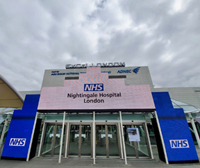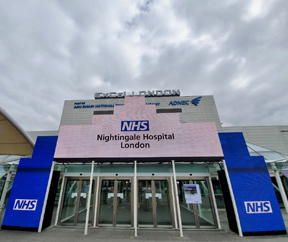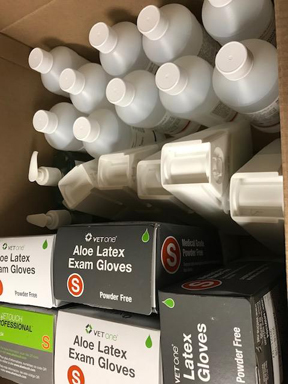
NHS 288

NHS England Twitter photo
Veterinarians who have volunteered to assist England's National Health Service have been told they might be called to one of the country's Nightingale field hospitals, which are dedicated to treating COVID-19. The first Nightingale hospital was erected in East London, shown; six more are built or in final stages of construction.
When it fast became clear that the world faced a shortage of supplies to treat COVID-19 patients, veterinarians across the world sprang to donate medical equipment, including ventilators and surgical masks.
Now, veterinary professionals from London to New York are preparing to offer something else: themselves.
Direct calls to the veterinary profession to assist in the hands-on treatment of COVID-19 sufferers do not yet appear to be particularly widespread. Many hospitals have been able to tap a supply of doctors and nurses no longer tied up with canceled elective procedures to serve on their front lines.
But calls for outside help have been growing louder in the past week or so, as the coronavirus caseload continues to rise rapidly in worst-hit countries such as the United States and the United Kingdom.
Britain's government-backed National Health Service (NHS) last week offered select veterinarians the opportunity to earn the equivalent of up to £24,157 (USD$30,080) per year to help treat human sufferers of COVID-19.
In the U.S., a number of states, including New York, Illinois and Vermont, are asking veterinarians to stand ready to assist if needed, whether by offering their medical expertise in hospitals or by taking care of the dead at mortuaries.
The strain on national health-care systems is worsened by instances of physicians and nurses becoming infected with the virus. According to a report released Tuesday by the U.S. Centers for Disease Control and Prevention, as of April 9, at least 9,282 health care workers in the U.S. alone had COVID-19, and at least 27 had died.
In Britain, dozens of doctors and nurses also have paid with their lives, while many more have been forced into home-based isolation after testing positive for COVID-19 at work.
'Bedside buddies' wanted
One particular NHS branch serving southwest England — the Torbay and South Devon NHS Foundation Trust — expects the number of intensive care beds it needs might soon rise by a factor of 10. In early April, it reached out directly to veterinarians for help.
"Whilst physical kit is relatively straightforward to source, suitably skilled personnel are the resource which [we] critically lack," two of the trusts' ICU consultants wrote in a letter to British veterinary associations.
The trusts' approach was first reported by the Health Services Journal. The letter's contents were confirmed to the VIN News Service by trust communications manager Laura Jenkins, who said it had received "many offers" of voluntary help from the veterinary community.
Jenkins confirmed that veterinarians and veterinary nurses (more commonly called veterinary technicians in the United States) would be trained as "respiratory assistants" who would act as the "eyes and ears" of intensive care medical personnel. The trust stressed that the roles would not entail having to make decisions about triage, airway interventions such as intubation, or decisions about withdrawal of active treatment. Training was being delivered virtually via Zoom, and the trust said it has assured volunteers that they will be provided with personal protective equipment.
"We are currently lobbying politically to insure your liability for this work," the ICU consultants wrote in their letter. "However, with a predicted two-week time period before the predicted surge, we wanted to start training so that we are not left behind by red tape."
Jenkins confirmed the positions at the Torbay and South Devon NHS Foundation Trust were purely volunteer; participants would not be paid. Elsewhere, however, other NHS trusts are offering money in exchange for help.
The Hampshire Hospitals NHS Foundation Trust, which services an area about 55 miles west of London, last week posted advertisements on job websites, including LinkedIn and Glassdoor, looking for "bedside support workers." (The Glassdoor post has since expired.)
Qualified veterinarians and dentists would be paid at the top end of the NHS's "band four" rates, currently £24,157 (USD$30,080) per year. Veterinary nurses and dental nurses would be paid at the top of "band three" rates, currently £21,142 (USD$26,325) per year.
"Patient care remains our top priority, and only those who are assessed to have the appropriate transferable skills, education and training will temporarily join our team," the trust's interim communications manager Vicky Miles told VIN News.
Yet another trust, the Imperial College Healthcare NHS Trust, which oversees five hospitals in London, has advertised for "bedside buddies" to assist in the treatment of COVID-19 cases. The position pays £22,478 to £23,810 (USD$27,990 to $29,645) per year.
"We have not done any targeted recruitment to specific professions; however, of course we would welcome applications from veterinarians and veterinary nurses," the trust's recruitment campaign manager, Katie Johnson, told VIN News.
Still, Britain's regulatory body for the veterinary profession, the Royal College of Veterinary Surgeons, is warning veterinarians not to get carried away.
Its registrar, Eleanor Ferguson, reminded the profession in a statement posted last week that there are legal restrictions on how much medical assistance veterinarians can lawfully provide and how they should represent themselves to patients.
"We recognize that the government's current priority is in re-recruiting retired and non-practising medical health professionals, and granting provisional registration to final-year medical students," her statement says.
"To this end, we would encourage veterinary professionals to first consider what assistance they might be able to provide to the livestock production, meat hygiene and food import/export industries, before volunteering to assist directly with local NHS Trusts."
Helping with those who have died
Letters

Across the Atlantic, in New York state, veterinarians have been asked to assist with a more macabre task: looking after the bodies of those killed by COVID-19.
On Monday, the Greater New York Hospital Association sent a notice to veterinarians on behalf of the state Office of the Chief Medical Examiner, requesting help with mortuary operations.
"They are particularly seeking veterinary staff because of their familiarity with the deceased and bereaved," the email stated, along with instructions for volunteering as mortuary staff in New York City. The city widely is reported to be overwhelmed by a coronavirus-related death toll that has surpassed 8,450.
"Somebody needs to take care of the dead, and they thought veterinarians would be good to help with that," said Tim Atkinson, executive director of the New York State Veterinary Medical Society. "They know they can trust veterinarians to treat the dead with respect, as medical professionals, keep good records and call the bereaved, if needed."
Not everyone welcomed the invitation. Some veterinarians were taken aback by language in the notice about handling bodies. Others were disappointed that the request for volunteers involves dealing with the deceased instead of caring for the living.
Far more, however, have expressed a desire to pitch in, Atkinson said. "I have certainly heard from people who have gone and put their names in," he said. "It's early, so I haven't heard if anyone's been selected. Hospitals will draw from that pool and reach out to people, as needed."
Requests in the U.S. for veterinarians to help out haven't been limited to mortuary work.
Latex gloves 288

Photo by Dr. Stephanie Keating
Disinfectants and latex gloves are among the medical supplies and equipment that the University of Illinois College of Veterinary Medicine is willing to donate toward the care of human patients with COVID-19.
The University of Illinois College of Veterinary Medicine has developed what it calls a COVID-19 Support Network of Illinois Veterinarians to help catalog emergency management resources in the state. Last month, the Illinois State Veterinary Medical Association sent emails to members on behalf of the network, which has collected names of practitioners who are willing to donate supplies and medical expertise to fight COVID-19.
More than 200 veterinarians had signed up as of last week to help as needed, said Dr. Stephanie Keating, a veterinary anesthesiologist and clinical assistant professor who started the network.
The Illinois Emergency Management Network has since taken over registration. State officials have identified veterinary medicine as a "priority occupation" on Illinois Helps, a website developed to help check the backgrounds and licenses of potential volunteers. An order by the Illinois Department of Public Health, Chicago Department of Public Health or their designees is needed to mobilize volunteers for medical purposes.
Keating also has compiled a list of equipment in the private and public sectors statewide that could be loaned to hospitals in need. "We're all working hard to coordinate these efforts," she said. "There is good communication within the emergency management agency, so if there's a need for physiologic monitors, for example, then that call would go out and people could respond."
Veterinarians in Vermont also are enlisting as potential volunteers, willing to donate their time and supplies to be used at human hospitals.
Gov. Phil Scott put out a call last week for those with medical experience to assist with the state's COVID-19 response. An online signup reads: "The COVID-19 pandemic is rapidly developing, so we are calling on Vermonters to sign up, let us know what skills they can offer, and be ready to serve if needed."
In a briefing Friday, Scott extended the state's stay-at-home order to May 15. Cautiously optimistic, he said the latest projection on coronavirus in Vermont suggests a peak in cases in the next two weeks.
"Right now, things seem to be OK,” said Dr. Erin Forbes, a spokesperson for the Vermont Veterinary Medical Association. "If we get called, they're not saying we're going to be intubating people and doing medical procedures. Hopefully, it never gets that bad. I think they would only sub us in if it's a dire circumstance."